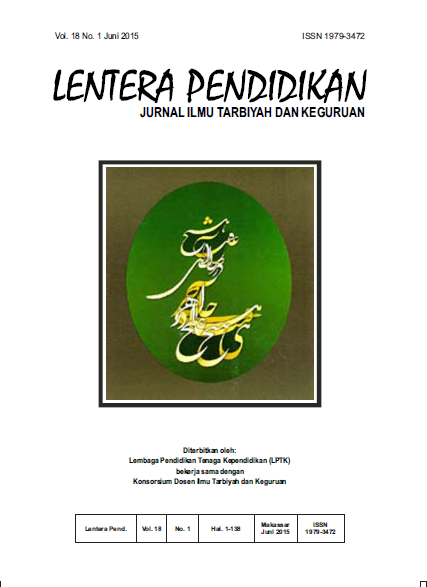KEUTAMAAN BELAJAR DAN MENGAJARKAN AL-QUR'AN: Metode Maudhu’i dalam Perspektif Hadis
Abstract
Abstract: Expression of the Prophet in the his words خَيْرُكُمْ مَنْ تَعَلَّمَ الْقُرْآنَ وَعَلَّمَهُ need to be examined/investigated its validity in order to generate high motivation for Muslims to practice it. Based on the search results of sanad and Matan of the hadith through many sources and where the focus of the study were Jami at-Tirmidhi, it can be concluded that the quality of hadith was valid. Thus, the Qur'an as a perfect reading for Muslims who has certain rules in reading, from the mention of the letters, the short or the length, the thickness and the provisions of makharijul of letters need to be learned and taught diligently and earnestly. Learning al-Qur'an includes efforts to learn how to read them, to translate and to understand the laws, the lessons, the instructions contained therein. Likewise, teaching al-Qur'an includes efforts to lead and guide people to read, to translate and to understand the content of the verses of al-Qur'an. People who do it sincerely and earnestly will get the primacy of the al-Qur'an in the form of tranquility, peace of heart and mind as well as the intercession in the hereafter.
Abstrak: Ungkapan Rasulullah saw. dalam sabda beliau خَيْرُكُمْ مَنْ تَعَلَّمَ الْقُرْآنَ وَعَلَّمَهُ perlu dikaji/diteliti kesahihannya agar dapat menimbulkan motiviasi yang tinggi bagi umat Islam untuk mengamalkannya. Berdasarkan hasil penelusuran sanad dan matan hadis melalui sumber yang banyak dan yang dijadikan fokus kajian adalah HR. Imam at-Turmudzy dapat disimpulkan bahwa hadis dimaksud adalah berkualitas sahih. Dengan demikian, al-Qur'an sebagai bacaan sempurna bagi umat Islam yang memiliki kaidah tertentu dalam membacanya, mulai dari penyebutan huruf-hurufnya, panjang pendeknya, tebal tipisnya serta ketentuan makharijul hurufnya perlu dipelajari dan diajarkan secara tekun dan sungguh-sungguh. Belajar al-Qur'an mencakup upaya mempelajari cara membacanya, terjemah, dan memahami hukum-hukum, pelajaran-pelajaran, petunjuk-petunjuk yang terkandung di dalamnya. Begitu pula, mengajarkan al-Qur'an mencakup upaya menuntun dan membimbing orang dalam membaca, menerjemah dan memahamkan kandungan ayat-ayat al-Qur'an. Orang yang melakukannya secara ikhlas dan sungguh-sungguh akan mendapatkan keutamaan dari al-Qur'an berupa ketenangan, ketenteraman hati dan pikiran serta syafaat di akhirat kelak.
Downloads
References
Abu Daud, Sulaiman bin al Asy'ats bin Syadad bin 'Amru bin 'Amir. Sunan Abu Daud, Kitab Shalat, bab fi Tsawab Qira’ati Al-Qur’an, hadis No. 1240.
Ahmad bin Muhamad bin Hanbal bin Hilal bin Asad, Abu Abdillah. Musnad Ahmad bin Hanbal. Kitab musnad al-‘asyarah al-mubasysyirina min al-jannah bab musnad ‘Usman bin Affan, hadis No. 389.
Al-Bukhariy, Abu Abdillah Muhammad bin Isma'il bin Ibrahim bin al Mughirah bin Bardizbah. Shahih al-Bukhariy, kitab fadhail Al-Qur’an bab khairukum man ta’alam Al-Qur’an, hadis ke 4639.
Ad-Darimy, Abdullah bin Abdurrahman bin al Fadhl bin Bahram bin Abdush Shamad. Sunan ad-Darimy, kitab fadha’il Al-Qur’an bab khiyarukum man ta’allama Al-Qur’an, hadis No. 3203.
Departemen Agama RI. Al-Qur'an dan Terjemahnya, Jakarta: Pustaka Agung Harapan, 2006.
Hadith Encylopedia ver. 1 [CD ROM], Harf Information Technology Company, 2000.
Ismail, M. Syuhudi. Metodologi Penelitian Hadis Nabi, Cet. I; Jakarta: Bulan Bintang, 1988.
M. Quraish Shihab, Wawasan Al-Qur’an, Tafsir Tematik atas Pelbagai Persoalan Umat. Cet. II; Bandung: Mizan, 2007.
Muslim bin al Hajjaj bin Muslim bin Kausyaz al-Qusyairi an-Naisaburi, Abdul Husain. Sahih Muslim kitab shalat musafir dan qashr bab fadl qira’atul Al-Qur’an dan surah al-Baqarah hadis No. 1337.
Nata, Abuddin. Metodologi Studi Islam, Cet. IV; Jakarta: PT. Raja Grafindo Persada, 2002.
Program Digital CD Room, Fathul Bariy bi Syarh Sahih al-Bukhariy, kitab fadhail al-Qur’an.
Al-Qaradhawi, Yusuf Kaifa Nata’amal Ma’a al-Qur’an diterjemahkan oleh: Kathur Suhardi dengan judul: Bagaimana Berinteraksi Dengan Al-Qur'an, Cet. I; Jakarta: Pustaka al-Kautsar, 2000.
Suriosumantri, Jujun S. Falsafah Islam Sebuah Pengantar Populer , Jakarta: Sinar Harapapn 1984.
At-Tahhan Mahmud. Usul al-Takhrij wa Dirasah al-Asanid diterjemahkan oleh Ridwan Nasir dengan Judul Metode Takhrij dan Penelitian Hadis, Surabaya: Bina Ilmu, 1995.
At-Turmuzy, Abu 'Isa Muhammad bin 'Isa bin Saurah bin Musa bin adl Dlahhak. Sunan at-Turmuziy, kitab fadhail Al-Qur’an ‘an Rasulillah, bab ma ja’a fi ta’limil Al-Qur’an hadis No. 2832 dan 2833.
Wensick, A. J. Concordance et Indices de la tradition Musulmane, diterjemahkan oleh Muhammad Fu’ad Abd al-Baqi’ dengan judul al-Mu’jam al-Mufahras li Alfaz al-Hadis al-Nabawiy, Juz I (Leiden: E. J. Brill, 1936 M.
Authors who publish with this journal agree to the following terms:
1) Authors retain copyright and grant the journal right of first publication with the work simultaneously licensed under a Creative Commons Attribution License that allows others to share the work with an acknowledgement of the work's authorship and initial publication in this journal.
2) Authors are able to enter into separate, additional contractual arrangements for the non-exclusive distribution of the journal's published version of the work (e.g., post it to an institutional repository or publish it in a book), with an acknowledgement of its initial publication in this journal.
3)Authors are permitted and encouraged to post their work online (e.g., in institutional repositories or on their website) prior to and during the submission process, as it can lead to productive exchanges, as well as earlier and greater citation of published work (See The Effect of Open Access).

